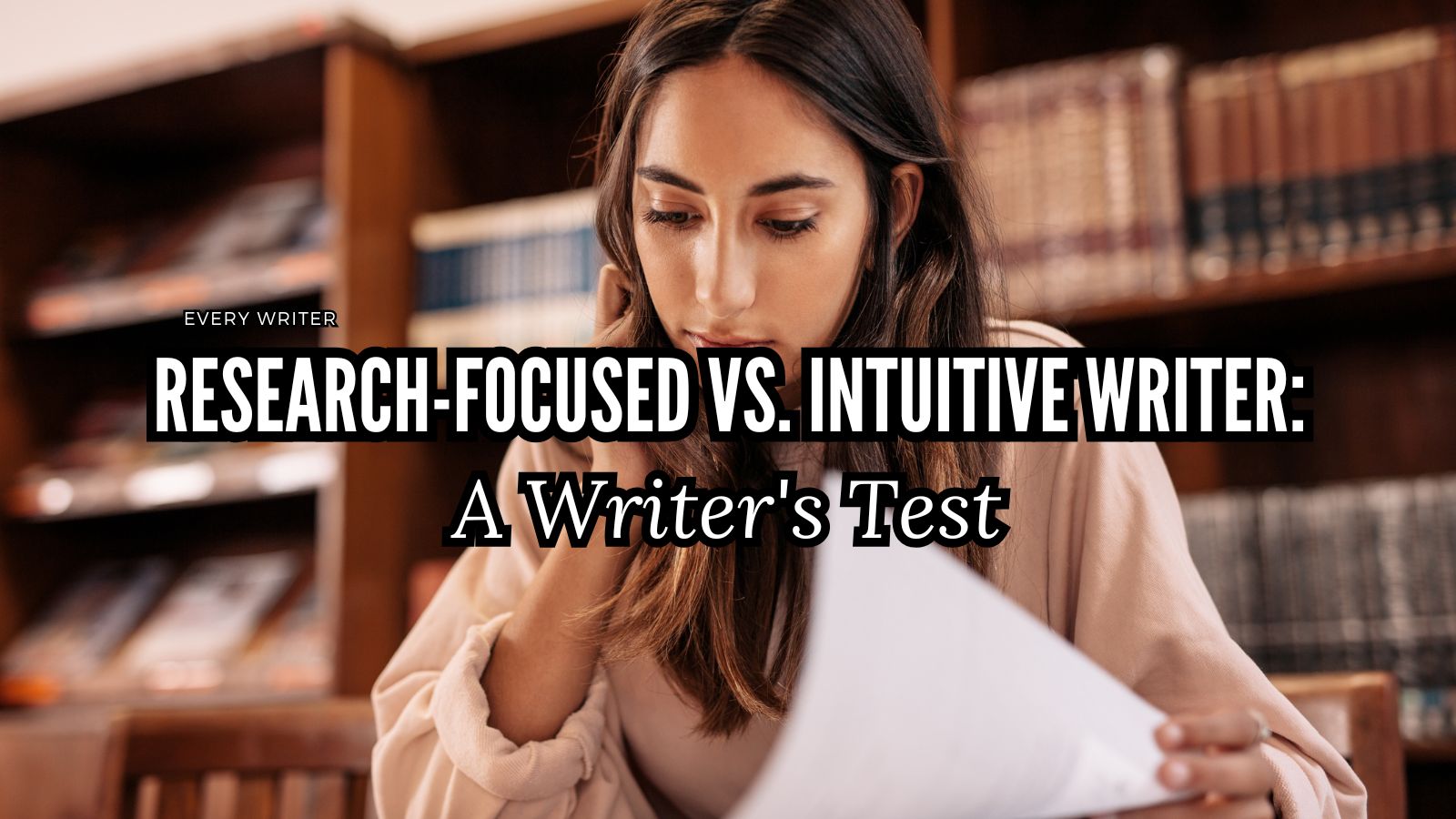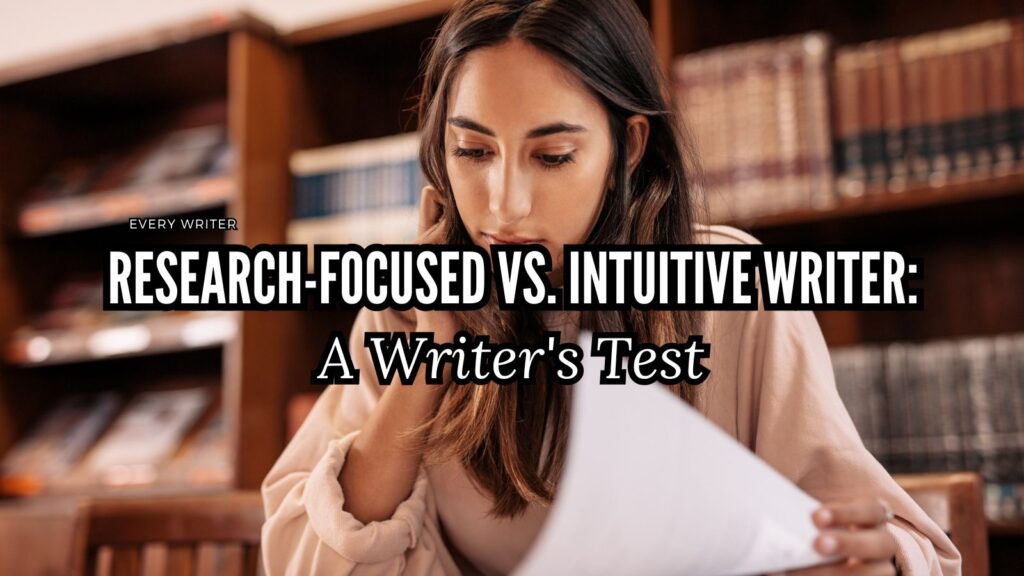Research-Focused vs. Intuitive Writer: A Writer’s Test
Instructions
Answer each question with True or False based on your natural writing tendencies. Be honest about how you actually write, not how you think you should write. Points are calculated based on Research-Focused tendencies—some questions award points for “True” answers, while others award points for “False” answers. Each question is worth 2 points.
Scoring
0-15 points (0-37.5%): Confirmed Intuitive Writer
You’re a true intuitive writer! You trust your creative instincts and prefer to let your imagination lead the way. Research feels like a distraction from the real work of writing, and you’d rather capture the emotional truth of a scene than get bogged down in factual details. You often use placeholders or make educated guesses about information you can verify later. Your strength lies in maintaining creative flow and producing authentic, emotionally resonant work that isn’t constrained by excessive fact-checking. While you may need to verify details during revision, your intuitive approach keeps your writing fresh and spontaneous.
16-25 points (40-62.5%): Balanced Researcher-Intuitive
You take a balanced approach, recognizing the value of both research and intuition. You likely do some preliminary research to establish a foundation of knowledge but don’t let it overwhelm your creative process. You know when to look up a crucial detail and when to trust your instincts. This flexible approach allows you to write with both authenticity and accuracy, adapting your level of research based on the project’s needs. You’re comfortable using placeholders when necessary but also enjoy the discovery process that research provides.
26-40 points (65-100%): Confirmed Research-Focused Writer
You’re definitely a research-focused writer! You feel most confident and productive when you have a solid foundation of knowledge before writing. You enjoy the research phase and find that thorough preparation enriches your writing with authentic details and nuance. Your methodical approach to gathering information helps you create credible settings, believable characters, and accurate scenarios. While you’re capable of using your imagination when needed, you generally prefer to verify facts and consult multiple sources rather than relying on assumptions. Your commitment to accuracy shines through in your well-informed, authoritative writing.
Understanding Your Results
Neither approach is inherently better—successful authors can be found in both camps and everywhere in between. What matters is finding the process that works best for you, which may even vary between projects.
Benefits of Research-Focused Writing:
- Creates authentic, credible worlds and scenarios
- Prevents factual errors that might pull readers out of the story
- Can inspire new plot directions or character details
- Particularly useful for historical, technical, or specialized subject matter
Benefits of Intuitive Writing:
- Maintains creative flow without interruption
- Often results in more emotionally authentic writing
- Can be more time-efficient in the drafting stage
- Allows for greater flexibility and spontaneity
Tips for Research-Focused Writers:
- Set clear boundaries on research time to avoid “research rabbit holes”
- Remember that not every detail needs to be perfectly accurate
- Consider scheduling separate research and writing sessions
- Don’t let perfectionism prevent you from actually writing
Tips for Intuitive Writers:
- Use placeholders (like [CHECK THIS LATER]) to maintain flow when unsure about facts
- Schedule dedicated fact-checking time during the revision process
- Consider consulting sensitivity readers for unfamiliar cultural content
- Build a reliable reference library for commonly needed information
Remember that many writers evolve in their approach over time, and you can borrow techniques from both styles depending on the needs of your current project. The goal is to find a process that makes writing both enjoyable and productive for you.
Humorous Interpretations
0-15 points: The “I’ll Google It Later” Improviser
Congratulations! You’re the literary equivalent of someone who confidently gives directions in a city they’ve visited once. Your search history is filled with panic-Googling like “can humans actually survive that?” after you’ve already written the scene. You’ve invented at least three fictional species of trees that botanists would find concerning. Your historical characters casually use technology from three different centuries, and your protagonists frequently visit places that sound suspiciously like cities you’ve seen in movies but never researched. Your beta readers have learned to say “interesting creative choice” instead of “that’s definitely not how submarines work.”
16-25 points: The “Just Enough Facts” Pragmatist
Well, aren’t you balanced! You’re like someone who reads the Wikipedia introduction and feels qualified to give a TED Talk. Your browser has exactly 17 tabs open—enough to feel informed but not so many that your computer crashes. You know the major landmarks of Paris but might accidentally place them on opposite sides of the Seine. Your historical characters use period-appropriate slang, which you learned from exactly one podcast episode. When readers point out inaccuracies, you confidently call it “creative license” rather than “I forgot to check that part.” Your research notes consist of cocktail napkins with hastily scribbled facts and at least one folder named “Stuff to Look Up Eventually.”
26-40 points: The “Actually, That’s Incorrect” Scholar
Oh my! You’ve never met a primary source you didn’t want to cite in your acknowledgments. You have strong opinions about the proper way to organize research notes and have definitely created a color-coded system that would impress librarians. Your friends worry about you when they see your office wall covered in timeline Post-its and maps that look suspiciously like you’re planning a historical heist. You’ve read seventeen books to write one scene about bread-making in medieval France. Your browser history is full of searches like “authentic 18th-century curse words” and “how long does it take blood to coagulate in winter conditions?” You regularly correct historical dramas aloud while watching TV, much to everyone’s delight (not really). When someone compliments your “imagination,” you respond with a fifteen-minute explanation of your research methodology.
- 100 Screenwriting Ideas to Get You Writing - January 20, 2026
- 100 Winter Storm Writing Prompts - January 17, 2026
- 100 Haunted House Story Starters: Craft Your Scariest Tale Yet - January 10, 2026






Too this and scored 5 lol